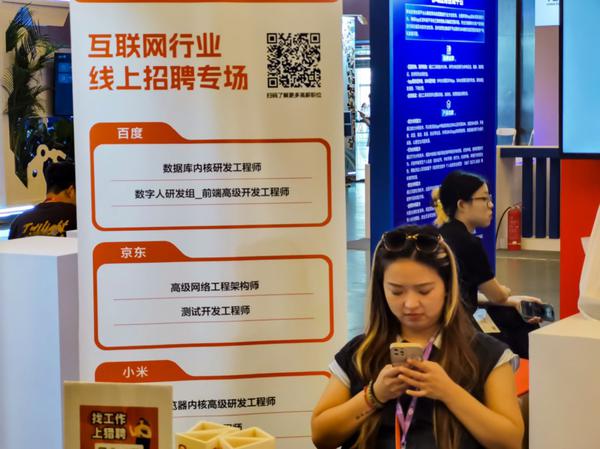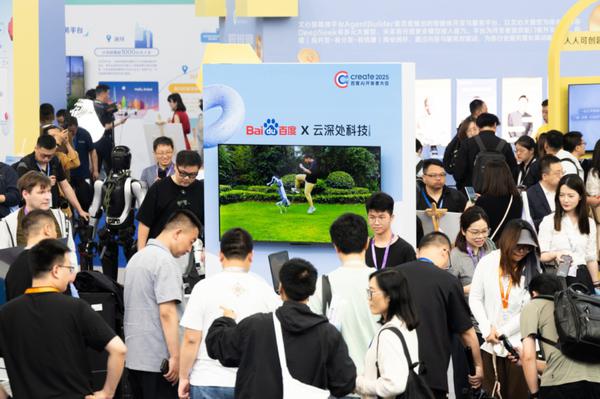Nascent artificial intelligence sector conducive to enhancing production efficiency, bolstering industrial upgrades, thus driving China’s economic growth

Staff members recruit through livestreaming during a campaign in Jinhua, Zhejiang province, on June 7. (HU XIAOFEI/FOR CHINA DAILY)
Shen Wenhan, a 30-year-old who has obtained a doctoral degree in wireless communication from Queen Mary University of London, will be formally employed with Chinese technology heavyweight Baidu Inc in July after finishing his internship as an algorithm engineer there.
During his internship, Shen and his team have been working on the research and development of an artificial intelligence application platform.
“By participating in the algorithm iteration of AI-powered products, I have not only gained a deeper understanding about how large models’ algorithm can be applied to businesses, but also rapidly improved my professional skills,” Shen said.
Shen added that he has received all-round training through online courses, training centers and one-on-one guidance from senior engineers of the company.
He said this internship experience has made him more rigorous and comprehensive while formulating queries, and that it has enhanced his abilities in terms of technology, communication and teamwork.
Like Shen, several fresh graduates are participating in key projects and taking on important positions during their internships, before accepting formal positions at enterprises. They are the “reserve forces” of talent recruitment that enterprises are attaching great importance to these days.
Creating jobs and maintaining stable employment are government priorities amid a complicated international environment.
Data from the Ministry of Education show that the number of college graduates in China is likely to reach 12.22 million in 2025, an increase of 430,000 from last year.
With a new round of scientific and technological revolution sweeping across various industries, Chinese technology companies have ramped up efforts to recruit talent engaged in AI and stabilize employment, given that cutting-edge digital technologies have become a key driving force of industrial upgrades and job structure transformation.
Baidu has said that it will train an additional 10 million AI experts over the next five years to benefit society and create more employment opportunities.
In a significant move to nurture future tech talent, it will offer 21,000 internship positions for outstanding campus candidates over the next three years, and continue to strengthen the training of interns, so as to further improve the intern-to-full-time employee conversion rate.
Baidu has offered more than 3,000 summer internship positions to students, with 87 percent of these centered around AI-related fields, including large language models, machine learning and autonomous driving. It will start its management trainee program and AIDU initiative this year, aiming to recruit top campus talent in the AI field, and foster future leaders in the AI era.
Currently, dozens of outstanding management trainees are deeply involved in the company’s core business and innovative development of AI, and over 100 doctoral degree holders have participated in innovative research in fields such as robotics, autonomous driving, deep learning and large models.

Staff members are at Chinese job-seeking service provider Liepin’s recruitment area for the internet industry during the China Internet Conference in Beijing on July 10. CHINA DAILY
Alibaba Group is also intensifying efforts to attract AI talent.
The company has kicked off its spring recruitment program, offering more than 3,000 internship openings for fresh graduates, with nearly half of these positions centered on AI.
More than 80 percent of positions offered by Alibaba Cloud — Alibaba’s cloud computing arm — are AI-focused. The AI-related positions from Amap, the mapping and local services business under Alibaba, account for about 65 percent of its total.
The recruitment plan targets students graduating between November 2025 and October 2026, with internships spanning multiple business units including research and development, algorithms, technology, security and planning, Alibaba said.
“As a technology company committed to exploration and innovation, Alibaba is ramping up efforts to attract and cultivate AI talent,” said Jiang Fang, chief people officer of Alibaba. “We hope to provide outstanding young professionals with broad development space to jointly embrace the immense opportunities in the AI era.”
During the spring recruitment period, Alibaba Cloud, in collaboration with the Tongyi Lab, will continue to advance its global talent recruitment initiative. Notably, fresh graduates will have the opportunity to participate in the cutting-edge R&D of large language models, jointly promoting advancements in artificial general intelligence.
“Leading Chinese tech companies have played a vital role in expanding employment and bolstering technological innovation, especially in AI, which will be conducive to enhancing production efficiency and bolstering industrial upgrading, thus driving economic growth,” said Jiang Han, a senior analyst at market consultancy Pangoal.
As new business models and evolving consumption patterns have popped up, new types of occupations related to AI have emerged in China and have become key sources of job creation, Jiang said.
These companies should strengthen talent cultivation and introduction, and equip the next generation of tech leaders with the skills and experience needed to drive innovation in the rapidly evolving AI field, Jiang added.
The Chinese authorities have taken various measures to support the employment of fresh college graduates and youth this year through policy and financial incentives to employers, and skills training initiatives and job services for students.
The Ministry of Human Resources and Social Security, the Ministry of Education, and the Ministry of Finance in April jointly issued a circular on expanding employment opportunities through multiple channels, such as increasing market-driven job creation and stabilizing public-sector employment. Organizations and enterprises have been encouraged to hire this year’s graduates as well as unemployed youths who have graduated in previous years.
Apart from enhanced efforts to recruit fresh graduates, Chinese platform enterprises, which mainly leverage digital platforms to provide services such as e-commerce, short videos and livestreaming sessions, are ratcheting up resources to create new job positions for the traditional labor force and expand employment space for disadvantaged groups.
According to a report released by the University of Chinese Academy of Social Sciences, the number of merchants on Chinese e-commerce platform Pinduoduo is about 14.2 million, and the platform has provided direct employment opportunities to about 18.6 million people.
Pinduoduo has cumulatively created 55.32 million jobs in China in four aspects — direct employment driven by merchants, employment in warehousing, distribution and logistics, employment of platform staff and indirect employment, the report said.

Visitors experience and interact with AI products during Baidu Create 2025 in Wuhan, Hubei province, on April 25. CHINA DAILY
It said that e-commerce platforms have not only created abundant employment opportunities in rural vitalization and community development, but also promoted the realization of inclusive employment. They are crucial for improving the quality of people’s lives, and laying a solid foundation for ensuring social fairness and stability.
As a leading domestic online marketplace for agricultural products, Pinduoduo has helped more than 300,000 new farmers to return to their hometowns to start new businesses.
Xie Ruiling, a mother of two children, lives in Ganjiang village of Tianshui, Gansu province, which is famed for its ruby-like Huaniu apples.
In the past, Xie could only do some odd jobs to supplement the family income. The turning point came in 2019 when Zhang Pengfei, a native of Tianshui, returned to his hometown and opened a fresh food store on Pinduoduo.
The sales of Huaniu apples at Zhang’s online store witnessed rapid growth, which propelled the construction of warehousing and cold chain facilities, and created many job opportunities for local villagers.
Zhang established a warehouse for storing fresh produce, and Xie was recruited and put in charge of packaging apples. Zhang’s warehouse has provided employment to more than 10 women like Xie, who all now have stable incomes.
“The rise of e-commerce platforms has enabled innovative technologies to have an impact on a broader population at an unprecedented speed. The ‘industry plus internet’ model has created employment opportunities for tens of millions of people engaged in industry, agriculture and services,” said Liu Xiaochun, an associate professor at the University of Chinese Academy of Social Sciences.
“It has offered a large number of jobs for disadvantaged groups such as women and the elderly, demonstrating the inclusiveness of this model,” Liu said.
Liu highlighted that the platform economy has demonstrated great potential in resource allocation as well as industrial synergy and integration, and played a significant role in promoting high-quality economic development.
Chinese short-video platform Kuaishou had created 43.2 million jobs and given rise to 174 new occupations by the end of 2024, according to a report released by the China Institute for Employment and Welfare Studies at Renmin University of China in Beijing.
The platform offered about 23 million direct employment opportunities for short-video creators and livestreaming hosts, who directly gained income through the platform last year. The number of content creators with a monthly income of more than 10,000 yuan increased by 14 percent compared with 2023, the report said.
Li Yongjian, a researcher at the National Academy of Economic Strategy under the Chinese Academy of Social Sciences, said livestreaming e-commerce is of great significance in bolstering the growth of consumption, expanding employment and narrowing the income gap between urban and rural residents, serving as an important force driving China’s high-quality economic development.
Moreover, Chinese manufacturing enterprises are strengthening employment opportunities, as China is vigorously advancing the high-end, intelligent and green transformation of its manufacturing sector.
Home appliance manufacturer Midea Group said it will intensify efforts to offer more than 2,000 job positions through campus recruitment this year. The company continuously stepped up recruitment in fields like AI, robotics, new energy and healthcare between January and April, with nearly 1,000 people recruited so far.
Pan Helin, a member of the Ministry of Industry and Information Technology’s Expert Committee for Information and Communication Economy, said that manufacturing is the main field for absorbing the surplus rural labor force while in the process of urbanization, and serves as an important foundation for nurturing new employment growth points.
![]()
![]()
www.ecns.cn (Article Sourced Website)
#Tech #firms #ramp #talent #recruitment
